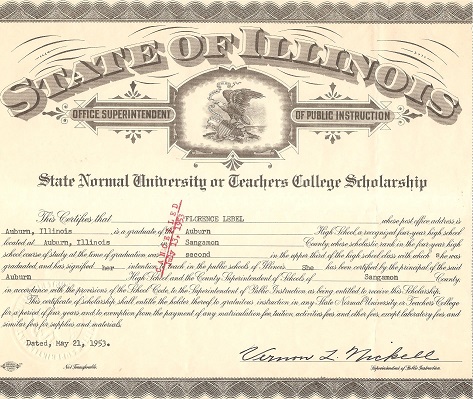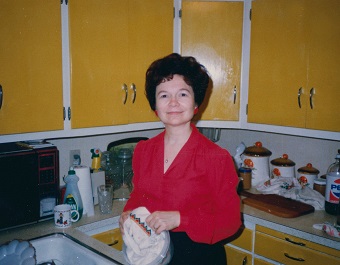A Servant's Legacy
When my mother passed away in 2010, my five siblings and I knew that a great lady had died. It didn't matter that she'd never earned a college degree or covered a wall with framed professional credentials. Those missing details meant nothing to us. Were she lying in state in the capitol rotunda, we wouldn't have felt more respect than we did the day of her funeral in our small-town church.
When Mom graduated from Auburn High School in 1953, her writing talent was already exceptional. The State of Illinois awarded her a four-year scholarship to any of its major universities, with all tuition paid. I found the scholarship after she died, marked "cancelled." Her father, a farmer from France, believed that college was a waste of money for a woman who would undoubtedly marry and become a homemaker. Considering the era, he wasn't particularly unreasonable.

My mother found a secretarial job in nearby Springfield and married my father, who had just been discharged from serving in the Korean War. They married in 1954. In 1957, they had me, followed by five more children. My father worked at a factory, and he and Mom built a modest ranch house two miles from the farm where my mom grew up. On Sunday afternoons, we kids romped in my grandfather's cow pasture, caught tadpoles in the pasture pond, and ice skated on the creek that bordered the farm. Mom never blamed her father for revoking her scholarship. Had she reacted badly, many of my fondest memories would've never existed.
As her children shifted from the cradle to the crib to the schoolhouse, Mom supplemented Dad's income by working part time for two local newspapers and a bank. As a correspondent for the Springfield Journal-Register, she covered city council meetings, school news, and other "breaking news" such as train derailments. Once, when she was busy caring for my brothers and sisters, she sent me out with a camera to take pictures of a derailed railroad car.
Of all my mother's jobs, I remember cake decorating the most. Whenever someone in the community ordered a birthday cake or graduation cake, our kitchen took on a new hue. Tiny glass bottles of food coloring materialized on the counter, along with Wilton Winnie-the-Pooh cake pans, funnel-shaped white icing bags that never stayed white, and metal tubes with jagged tips that magically created roses and leafs. Bowls, spatulas, spoons, and beaters all became the hue of the latest decorated cake.

Wedding cakes meant extra-special desserts for us. The mound atop each layer had to be sliced off to make the layers level for stacking. We often found them—sometimes in crumbled form—in our dessert pudding. We knew it the instant our spoons hit solid earth beneath the creamy surface.
Baking cakes for customers and preparing meals for our family of eight left my mother little time for leisure. After a long day, while the rest of the family watched television, she settled beneath the lamplight with a good historical novel—one she could've written herself had her career path turned a different direction.
When I moved away from home and attended one of the colleges my mother was prevented from attending, I knew she would always be available on the other end of the telephone line. If she didn't answer, I would become annoyed, as if she had left her post without permission.
When her children were all grown, she helped raise her grandchildren, continuing to read historical novels by lamplight in the evenings while they watched television. Most of her children and grandchildren went on to graduate from college, some even earning master's degrees.
Perhaps every mother is a giant among women to her children. But at her funeral in 2010, we knew it. The longer I live, the more I know that it's not the front-page news of publishing a novel or splitting the sea that makes the most profound difference. It is the "being there," the quiet dependability of a faithful servant through thick and thin, that bolsters us without our ever marking those moments on a calendar. It is the memory of the unassuming, steadfast love of the deceased that makes us weep at graves, when the curtain opens on a loved one's lifetime and we begin to realize just how much our loved one split the sea for us.
My mother was a chief because she was a servant. She denied herself for my good. As I sit amid my diplomas, I continue to aspire to the level of distinction achieved by one whose scholarship was marked "cancelled."
And whosoever will be chief among you, let him be your servant. (Matthew 20:27 KJV)